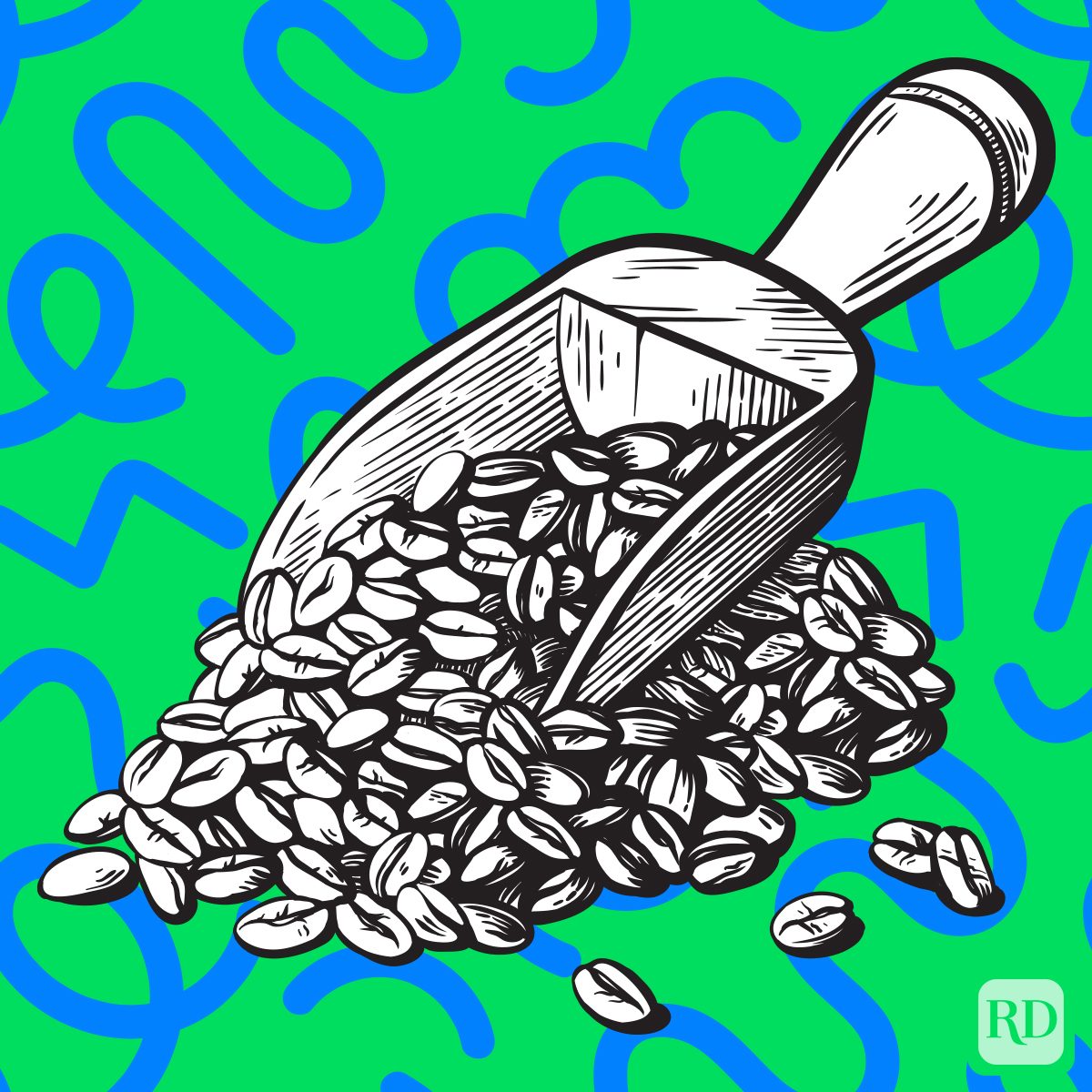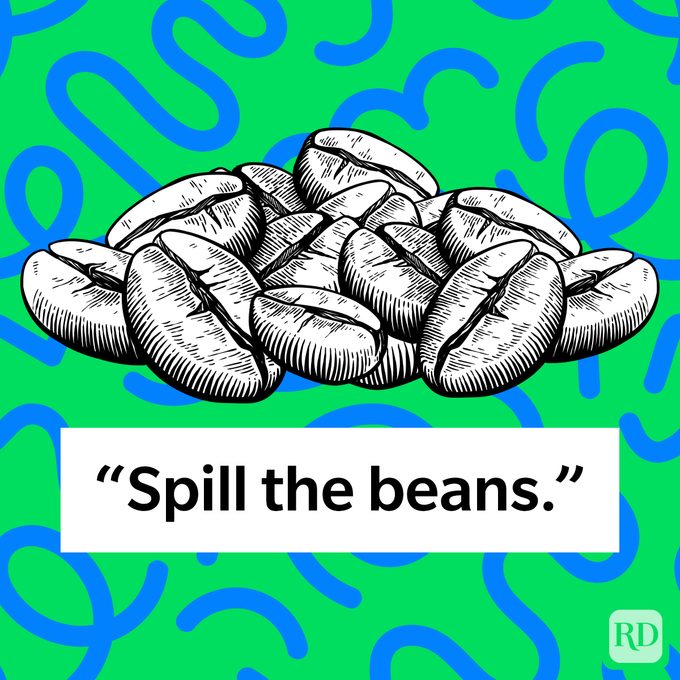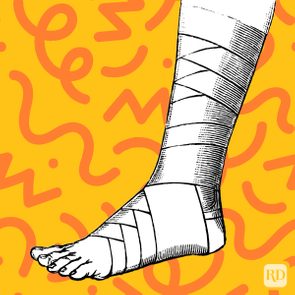Let's dig into this classic idiom—because some secrets are too good to keep!

Where Does the Phrase “Spilling the Beans” Come From?

Want to know a secret? English speakers are a curious bunch—so curious, in fact, that in the face of potential gossip, we resort to spilling the beans. You’ve no doubt heard the phrase before (along with the modern equivalent, spill the tea), but chances are, you’ve never thought about where it comes from. Why, exactly, are we talking about beans? And why are they being spilled?
I asked two language historians to spill the beans on the origins of this idiom and explain how to properly use it. Read on to learn more!
Get Reader’s Digest’s Read Up newsletter for more word history, humor, travel, tech and fun facts all week long.
What does spilling the beans mean?
According to the Oxford English Dictionary (OED), spill the beans‘ meaning is “to reveal a secret.” You might use this slang phrase when:
- Chiding someone for disclosing information prematurely.
- Admonishing someone for revealing information that wasn’t theirs to share.
- Urging someone to share a secret.
When would you say someone has “spilled the beans”?

You’d use the phrase spill the beans in casual conversation to let someone know they said something they shouldn’t have or when you want them to divulge details—that you know they shouldn’t. Here are some examples:
- “The deal was supposed to be confidential, but someone spilled the beans to the press.”
- “We weren’t going to reveal the gender until the baby was born, but my husband spilled the beans to his brother.”
- “I promised I wouldn’t spill the beans, but this surprise party is going to be epic!”
- “The detective pressured the suspect until she finally spilled the beans about the stolen necklace.”
- “Come on, just spill the beans already! What did she say?”
You wouldn’t use spill the beans when no secret is involved or in really serious situations.
What is the history of the phrase spilling the beans?
The exact origin of spill the beans is uncertain. “That’s not to say there’s no way to know,” says Michael Adams, PhD, a professor of English and linguistics at Indiana University. “What you know is that nobody’s found out yet.”
That said, let’s try to piece together what we can about spill the beans‘ origin.
A brief history of spill
Per the OED, the verb spill was used as far back as 1577 to mean “to divulge or let out.” Adding beans could have been a colorful way to reinforce the idea of revealing something.
Interestingly, as far back as the early 15th century, spill was also used to mean “scatter,” which is notable because beans (like seeds) are often scattered.
An ancient use for beans
One possible explanation for where spill the beans came from dates back to ancient Greece, where people would use beans to vote: White beans were used for positive votes, and dark-colored beans represented negative votes. These votes were cast in secret, so if someone knocked over the beans in the jar—whether by accident or intentionally—they spilled the beans and revealed the results of the votes prematurely.
But Laurel Brinton, PhD, professor emerita at the University of British Columbia in Vancouver, Canada, doesn’t think that theory has any merit. “There’s just no evidence connecting it to the 20th-century examples,” she says.
The first recorded use of spill the beans
The first use of this phrase recorded by the OED was in 1919 in The Man from Tall Timber, a Western novel by Thomas K. Holmes:
‘Mother certainly has spilled the beans!’ thought Stafford in vast amusement.
After that, there are many recorded instances of the common expression, which we still use today.
OK, then what does it mean to spill the tea?
A contemporary variation of the phrase spill the beans is spill the tea. As Merriam-Webster points out, the modern expression originated in Black drag culture and took off on the internet. The phase isn’t speaking about the steaming-hot stuff you’d sip from a teacup—tea (or T) stands for “truth.” It appeared in print as early as the ’90s.
“It’s the same sort of thing: Tell me the gossip, divulge a fact to me,” says Adams. “It’s interesting that it was a solid substance to begin with, and now we’ve got a liquid counterpart to it.”
What are some other synonyms for spilling the beans?
Here are a dozen ways to say someone has revealed a secret or given away info:
- Spilling the tea
- Letting the cat out of the bag
- Blabbing
- Dishing the dirt
- Divulging secrets
- Dropping a bombshell
- Giving the game away
- Letting it slip
- Letting the genie out of the bottle
- Lifting the curtain
- Shooting your mouth off
- Singing like a canary
- Telling all
What other idioms include the idea of beans?
Beans aren’t just for spilling. Quite a few everyday idioms include beans—here are some interesting ones:
- Full of beans: Energetic, lively or enthusiastic
- Cool beans: “Awesome” or “great”
- Doesn’t amount to a hill of beans: Something insignificant or unimportant
- Tough beans: “Too bad” or “deal with it”
- Bean counter: An accountant or someone obsessed with financial details
- To not have a bean: To have no money
- Magic beans: Something seemingly worthless that turns out to be valuable (from Jack and the Beanstalk)
Why are beans so popular in idioms?
Beans are popular in idioms because “they have little value,” says Brinton. Since they’re a cheap staple food worldwide, beans are a common reference point in many cultures. Plus, whether you’re talking about kidney beans or coffee beans, their small size and ability to be spilled or scattered makes them a great metaphor for little things, like secrets or minor concerns.
So the next time you hear some juicy gossip, don’t spill the beans—keep it to yourself!
About the experts
|
Why trust us
At Reader’s Digest, we’re committed to producing high-quality content by writers with expertise and experience in their field in consultation with relevant, qualified experts. We rely on reputable primary sources, including government and professional organizations and academic institutions as well as our writers’ personal experience where appropriate. We verify all facts and data, back them with credible sourcing and revisit them over time to ensure they remain accurate and up to date. For this piece on spilling the beans, Jo Ann Liguori tapped her decades of experience as a copy editor to ensure that all information is accurate and offers the best possible advice to readers. Read more about our team, our contributors and our editorial policies.
Sources:
- Michael Adams, professor of English and linguistics at Indiana University Bloomington; phone interview, Jan. 31, 2025
- Laurel Brinton, professor emerita of English historical and contemporary linguistics at the University of British Columbia in Vancouver, Canada; phone interview, Jan. 31, 2025
- Oxford English Dictionary: “Bean”
- Oxford English Dictionary: “Spill”
- Merriam-Webster: “Let’s Talk ‘Tea'”























